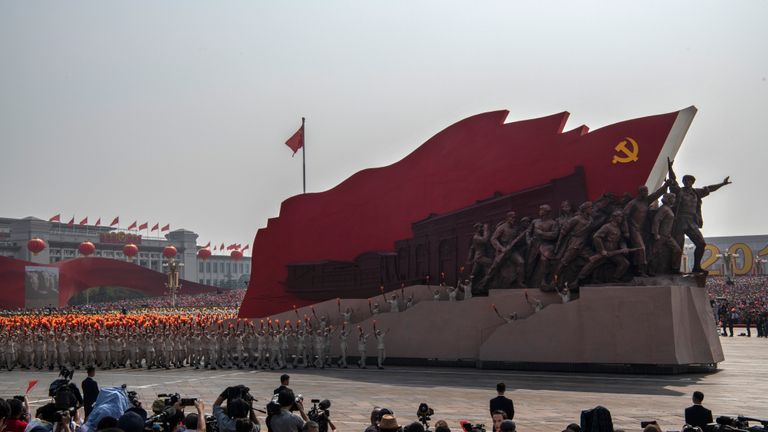Grand military parade in China marks 70 years of communist rule
Some 15,000 troops marched in Beijing which also saw gun salutes, a military flypast and a new nuclear missile on display.
Wednesday 2 October 2019 09:55, UK
A grand military parade has been staged in China to mark 70 years of communist rule in the country.
Chinese President Xi Jinping rode an open-top limousine past symmetrical rows of troops and military vehicles, shouting "Hello comrades" as he passed.
The troops shouted back "Hello chairman" and turned their heads in unison to watch the president.
Marching troops, a military band and a military gun salute were deployed as President Xi addressed a crowd of thousands following a flag-raising ceremony at Tiananmen Square.
The square was only open to invited guests but the president's speech was broadcast live across the country.
China's ruling Communist Party organised the grand parade to showcase the country's military capabilities and mark the anniversary of the founding of the People's Republic of China.
A new hypersonic ballistic nuclear missile - believed to be capable of breaching anti-missile shields - was among the weapons displayed during the event.
The parade through central Beijing includes 15,000 troops and more than 160 aircraft.
A large section of the city's main street has been closed for the event and buildings along the route have also been closed.
It comes as a day of protests is expected across Hong Kong, with posters advertising the action calling for 1 October to be marked as "A Day of Grief".
Pro-Beijing protesters scuffled with a small group of pro-democracy protesters in Hong Kong, despite police attempting to keep the two groups apart.
The pro-democracy protesters planned to march on the 70th anniversary celebrations.
Hong Kong's acting leader, Matthew Cheung, said his city has become "unrecognisable" due to the violent protests rocking the territory.
Mr Cheung, representing Hong Kong leader Carrie Lam, said the government would use new thinking to address the problems voiced by protesters.
:: Listen to the Behind the Headline podcast on , , ,
A show of strength while China is unusually fragile
By Tom Cheshire, Asia correspondent, in Beijing
The authorities placed microphones by the side of the square to pick up the sound of the troops' step and send it reverberating around Tiananmen - either to help the 15,000 troops behind keep time or for the benefit of viewers at home. (Members of the public aren't allowed to watch at the square or on the streets, so they tune into state-run TV instead.)
They probably didn't need to bother with the microphones. I was standing close and the sound was deafening. But it showed the meticulousness of the party and their determination that this spectacle would be a success.
It was a deliberate echo of the past. President Xi Jinping stood at the same rostrum where Chairman Mao declared the founding of the People's Republic of China 70 years ago today.
He ditched his usual business wear for a Mao suit and even sounded like the Great Helmsman: "Today, a socialist China is standing proudly in the world's East."
Then he inspected the troops, standing through the sunroof of a traditional back sedan.
"Hello comrades," he said, again and again. "Hello chairman," they shouted back as one.
Each male soldier here had only been selected if he were between 5ft9in and 6ft1in tall.
But the weaponry was cutting edge. One of Xi's signature policies has been the modernisation of China's armed forces and the results of that were on display.
Jets screamed overheard, releasing colourful plumes behind them that also contributed to the smog (uncharacteristic smog at that - usually the skies are made blue ahead of important events in Beijing).
Unmanned aerial vehicles, hypersonic missiles and a new generation of intercontinental ballistic missiles, capable of carrying nuclear warheads and of reaching the US, were also on display.
It was a show of strength, only at a time when China is unusually fragile. The economy is slowing - even before the current trade war with the US. Its population is ageing fast.
And then there is the unrest in Hong Kong - the biggest challenge to Communist rule in a long while.
After the military parade came the civilian procession. A never-ending succession of exuberant and sometimes bizarre floats celebrating China's social and economic success. Crowds of enthusiastic members of the public (specially selected and with months of hard training behind them) waving flags and singing songs.
This is the part that reminded me of North Korea - we were in Pyongyang for the country's own 70th anniversary last year. The main difference is that China's version is much richer and much slicker.
One of the floats today represented Hong Kong. Its slogan said: "Tomorrow Hong Kong will be better." But the Party cannot dictate terms quite so easily outside of Beijing.
At the end of the parade, 70,000 doves were released. It was an extraordinary sight. Birds cooped up for who knows how long set free, and they flew this way and that.











